This is not justice, say grieving relatives after firm responsible for Covid-hit Kettering care home is fined
and live on Freeview channel 276
Kettering’s Temple Court care home should have been a safe place for vulnerable residents.
Instead those who lived there, and their families, were horrifically let down in the early months of the Covid pandemic in 2020. During that period 15 residents died, some after contracting the virus, before health bosses moved everyone out in May.
Advertisement
Hide AdAdvertisement
Hide AdYesterday (Tuesday) their grieving relatives sat and listened as a picture of failure was painted at Northampton Magistrates’ Court. The home’s population doubled in just six weeks, but they did not properly assess the impact it would have on those living there. There was no manager, deputy manager or clinical lead for weeks, with nobody appearing to be running it. Some residents were found dehydrated, unkempt or malnourished. None of the deaths were proved to have resulted from any failure to comply with health regulations.
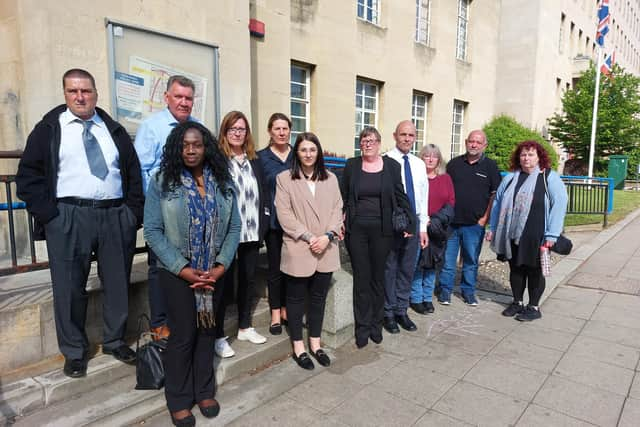

The firm that ran the now-closed Albert Street home, Amicura Limited, has been fined £120,000 after pleading guilty to four charges of failing to provide care and treatment in a safe way and has apologised.
But those who lost a loved one say they feel it is far from the justice their relatives deserve.
‘A kick in the teeth’
Jackie Barrett's uncle Leroy Cunningham was at Northampton General Hospital because of a fall before being transferred to Temple Court in April. She rang two or three times to check he was okay and was told everything was fine.
Advertisement
Hide AdAdvertisement
Hide Ad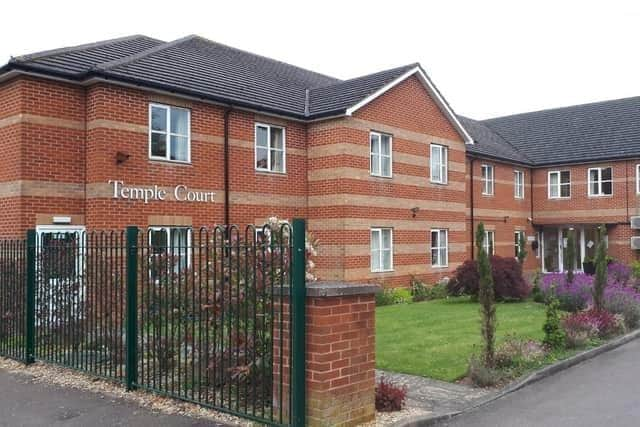

She had not been able to speak to Leroy and was planning to try and visit him when the home rang her to say he had died. Jackie says she still does not know what happened three years on.
She said: "I thought we would get justice today but we haven't."
Stanley Cantrill was also at NGH before being moved to the Kettering care home on May 4, 2020. He died a week later aged 93 and his daughter-in-law Cathy Cantrill believes he had Covid.
She said they were not told of his death for 14-and-a-half hours and only then because they called a carer, adding that they never got his personal belongings back.
Advertisement
Hide AdAdvertisement
Hide Ad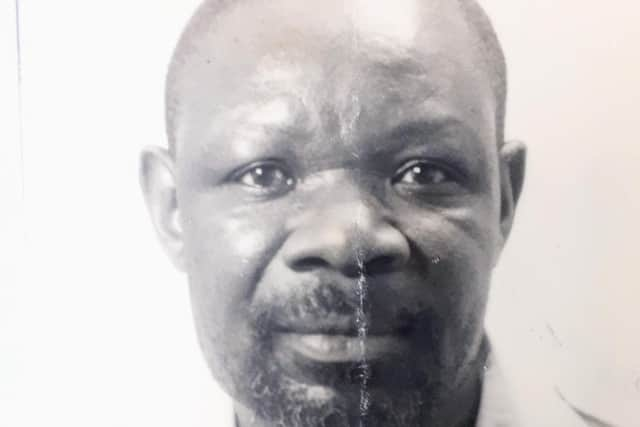

Cathy said: "We feel like this is a kick in the teeth. It's an insult to Stanley."
Community champion Royston Hunt had lived at the home since 2018 and died on April 19, 2020, having tested positive for the virus when he was taken to hospital with a suspected chest infection three days earlier.
The 83-year-old had not seen wife of 63 years Kay since early March because visits to the home had been suspended. Kay never got to say goodbye.
Royston’s daughter, Karen Smith, said: "No matter how much money the fine was it would never bring back our loved ones.
Advertisement
Hide AdAdvertisement
Hide Ad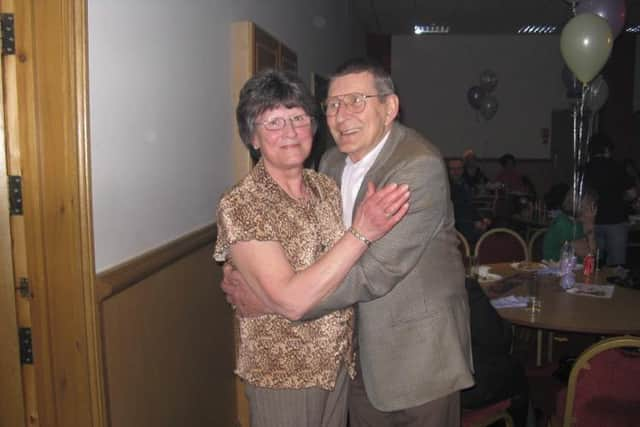

"But £120,000 is absolutely nothing. Amicura should not be able to have another home."
‘Stretching the truth’
A police probe into the home ended with no further action, but a prosecution was brought by the Care Quality Commission (CQC).
Prosecutor James Marsland, representing the health watchdog, outlined how the level of care deteriorated at the home as more than 20 friends or relatives of those who lived there watched from the court’s public gallery. Others listened in through a court videolink.
He told the court that the number of residents at the home increased from 25 to 51 between late February and early April 2020, when hospitals were discharging people to try and free up beds ahead of an anticipated influx of Covid patients.
Advertisement
Hide AdAdvertisement
Hide AdHe said: "The prosecution case is that Amicura Limited did not at any time adequately assess the risk that such a significant increase presented to the provision of safe care and treatment to the resident population as a whole."
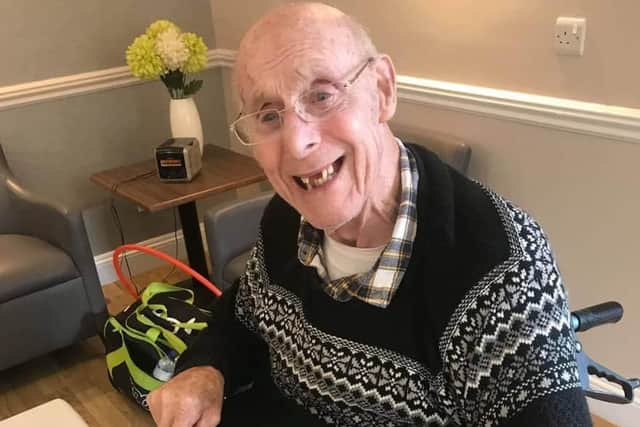

There had been no deputy manager in place since January and a clinical lead worked four shifts before shielding, the court heard. Then, on April 4, the home’s manager went off sick with Covid, leaving a senior carer with two years of experience in the role effectively in charge, without having any formal training. The home was relying on agency staff, with different faces coming in almost every day.
But before the manager left they were behind on risk assessments and care plans, with care needs for residents not being met. The level of care deteriorated and by April 17 the CQC and Northamptonshire’s Clinical Commissioning Group (CCG) contacted the home to seek assurances around safety.
Three days later the CCG spoke to the Surrey firm’s area manager who gave them assurances. They told them the home’s manager was still self-isolating but was in contact with them and that staff from a sister home, Cheaney Court, were visiting daily.
Advertisement
Hide AdAdvertisement
Hide AdMr Marsland said: "In terms of these assurances they somewhat stretched the truth of the position of the home at that point in time."
By April 29 the deterioration in the level of care and treatment being provided at Temple Court had generated a number of complaints, safeguarding referrals and whistle-blowing reports. The next day CCG bosses visited the home and, because of what they discovered, Amicura director Colin Farebrother agreed to a self-suspension. The CCG decided to deploy a nurse-led taskforce into the home on May 2, but by May 12 they decided the situation was irrecoverable and moved all residents from the home, before it closed down.
‘Uncaring, unsympathetic and inept’
Statements read in court by Mr Marsland described the harrowing impact the lack of care had on the relatives of those who were living there.
Alice Campbell, the widow of Temple Court resident Peter Haynes, said she believed he was neglected.
Advertisement
Hide AdAdvertisement
Hide AdHe had a fall resulting in a fractured femur and hospital admission. He was later readmitted to hospital, this time because he had severe renal failure. He was severely dehydrated and had a chest infection. A few days before he died he was described as having multiple skin tears, bruising to his arms and being of a skeletal state.
She said: "He was not treated with dignity...he was allowed to become unkempt and when I saw him at the undertaker's he had a full beard.
"Peter hated beards and he did not look like the man I had been with for the last 42 years."
She was distraught when she found out that Temple Court had closed down.
Advertisement
Hide AdAdvertisement
Hide AdShe said: "In the last few months of his life I wasn't there to care for him in that place. I imagine him being frightened and bewildered and asking for me at Temple Court and this is something I will never forget."
Kathleen Blunsom was admitted to Temple Court for respite care on March 6, a decision not taken lightly by her family as they wanted to keep their parents together and at home for as long as possible.
She had a wound that was not dressed properly by care home staff. Relatives raised concerns that she was not eating, witnessed dirty dressings and reported that she was dehydrated. She was eventually relocated to another home after nurses also raised concerns.
Her daughter Belinda Kelland said: "I wake up daily grieving with the knowledge that my beloved mother was subjected to an uncaring, unsympathetic and inept environment.
Advertisement
Hide AdAdvertisement
Hide Ad"Our father died thinking that mum was being cared the way he had loved and looked after her for 65 years. We had promised him this, yet the truth has left us all with a bitter taste of disappointment, disgust and an overwhelming daily guilt of failure, but was that failure ours?
"No, we were failed by the apparent care providers, yet that still doesn't stop the hurt and anger my family and I feel. It has left us feeling inadequate as we were not able to protect her."
Madge Clayton had been at the home since 2018 and had diabetes, but care home staff failed to manage it. She was taken to hospital on March 1 where her condition was life-threatening and paramedics made a safeguarding referral. She recovered and returned to the home but died on May 1.
Her daughter Sheila Langley said: "The next thing I remember about Temple Court is reading in the newspaper that it had been shut. I thought what on earth had been going on for it to be closed so abruptly?
Advertisement
Hide AdAdvertisement
Hide Ad"Three years later I feel really sad. I wonder what mum's last days were like. It upsets me as I feel she was all alone in her room...I would like to know why the provider did not ask for assistance during this crisis. Surely they should have recognised that they were not coping and were out of their depth."
Mikhail Waskiw was admitted to Temple Court on February 28 but was failed in relation to fall risk management. He required hospital admission after a fall on March 8 and died on April 5. His family later told the Northants Telegraph they were angry they were not told about the Covid outbreak or given the opportunity to take him home.
Tears, blame and guilt
The court heard that, when CCG chiefs visited the home on May 7, they found one of the nurse-led taskforce crying in her car because they were so concerned.
Amicura director Mr Farebrother, 57, also cried when he was challenged. He had faced four similar charges but they were withdrawn at Tuesday’s hearing.
Advertisement
Hide AdAdvertisement
Hide AdOn the first day of a CQC inspection he said the lack of oversight was indefensible and that staff had been overwhelmed.
A statement by the senior carer who was effectively in charge, read out at court, said she felt a lot of blame and guilt but that she suddenly had responsibility for 50 people with little help or support.
She said: "I cannot understand why at no time was I contacted by any director or management to help me."
One CCG nurse who was part of the taskforce which stepped in said: "In my 20 years of being a nurse this is one of the worst conditions I have seen residents or patients in."
Advertisement
Hide AdAdvertisement
Hide AdMark Ruffell, representing Amicura Limited, told the court that the firm offered an 'unreserved apology' to those adversely affected by what took place at the home.
Mr Ruffell said there was a lack of regular contact with care homes by the local resilience forum about the impact of accepting new residents.
He said that the home’s manager was being emailed multiple times a day saying ‘please take this person’ – but that when residents were accepted they were not being properly assessed.
The court heard the manager did not request help before going off with Covid on April 4 and that directors believed the home was being well-run.
Advertisement
Hide AdAdvertisement
Hide AdMr Ruffell said that when the state of the home was known on April 7 the directors took action.
He said: "Had the true position been known they would have restricted the number of admissions back at the start of this."
‘This is not about money’
Amicura Limited, which had a turnover of £13m for the year to March 2022, stood to financially benefit from doubling their number of residents. But the court was told that money played no part in the home manager’s decision to take on more residents than they could properly care for.
Mr Ruffell said: "This is not about money. This is about oversight and unfortunate, in hindsight, wrong decisions being made on the ground level."
Advertisement
Hide AdAdvertisement
Hide AdMr Marsland added: “The evidence is that the company did not make a conscious decision to pursue that financial benefit knowing it would impact on safety. It was a failure to assess the risks, rather than being cognisant of the risks."
District Judge Nick Watson was also told that Amicura had made several attempts to recruit staff which were thwarted by Covid restrictions. But he said the pandemic, and problems finding staff, were no excuse.
Ros Sanderson, the CQC’s deputy director of enforcement, said: “The people living at Temple Court care home were catastrophically let down by the care provider’s poor systems and processes.
"We expect all residents to receive care and treatment in a safe way and to make sure that when people move into a service, the leadership team have the managerial oversight to keep people safe.
Advertisement
Hide AdAdvertisement
Hide Ad"Anyone would expect that if a service was to double the number of the people living at their service, managers would have undertaken risk assessments for those people moving in and ensured that there was enough staff to ensure people’s safety, particularly during the pandemic. This did not happen at Temple Court.”
Amicura Limited, which has 12 remaining homes, say they conducted a lessons learned review and made a series of changes including appointing an independent chair to their board of directors.
A spokesman for Temple Court, which had been rated as requires improvement in 2019, said: “With the benefit of hindsight, we recognise now that whilst we felt at the time we were acting in the national interest and supporting the NHS by accepting patients discharged from hospitals into care homes under Government policy at the start of the Covid-19 pandemic, this actually placed incredible strain on our team – leaving many of them overwhelmed, exhausted and themselves ill with the virus.
"This, together with the rapid rate of discharges from hospitals to the home, had a significant and detrimental effect on the running of the home and the care provided to our residents.
Advertisement
Hide AdAdvertisement
Hide Ad“These factors were unprecedented, but that does not excuse what happened and we know we must do better in the future. We are fully committed to our journey of continuous improvement and remain determined to deliver the best possible care for every resident.”
‘We feel completely let down’
Many relatives of Temple Court residents said they had not received an apology until the court hearing. A letter, which had been sent to some to explain what had happened at the home when it closed, did not contain the word sorry.
Judge Watson, using sentencing guidelines, imposed a fine of £120,000 on Amicura Limited and ordered them to pay the CQC costs of £80,000.
In his sentencing remarks, he said: “This order can go no way to remedying that suffering. Those who have been badly affected by the performance of the defendant company have the sympathy of the court and, now at least, an unreserved apology for the way they were treated."
Advertisement
Hide AdAdvertisement
Hide AdBut those who witnessed what happened when their loved one moved to Temple Court said it doesn’t feel like justice.
Linda Lake's mum Maria Nikiforuk moved to the home in 2018 and had dementia. Linda said staff told her everything was okay but she caught Covid and ended up in hospital twice with a chest infection and dehydration. She did not get to see her family before she died aged 93.
Linda said: "If they had not taken these people in with Covid she would probably have been with us a bit longer. It's been very hard for us.
"I don't think the punishment is much – to me it's like they have got away with it."
Advertisement
Hide AdAdvertisement
Hide AdPaul Freeman’s mum Cathy Hulett was on end-of-life care at the home and had a strict medication routine.
But he has been left questioning whether Temple Court staff gave her the care she desperately needed before she was moved to Cynthia Spencer hospice on May 12. She died 10 days later aged 71.
Paul said: "I find it hard to believe that they adhered to it. She would have found it really hard and she couldn't fend for herself."
Shannon Kelland, Kathleen Blunsom's grand-daughter, described the court outcome as 'bull****".
Advertisement
Hide AdAdvertisement
Hide AdShe said: “£120,000 is little less than a penny to them. The problem is they can continue working in this industry."
And Belinda Kelland added: "We feel completely let down. This won't impact them and they will be able to carry on as normal, but we'll always be thinking about what happened to our loved ones."